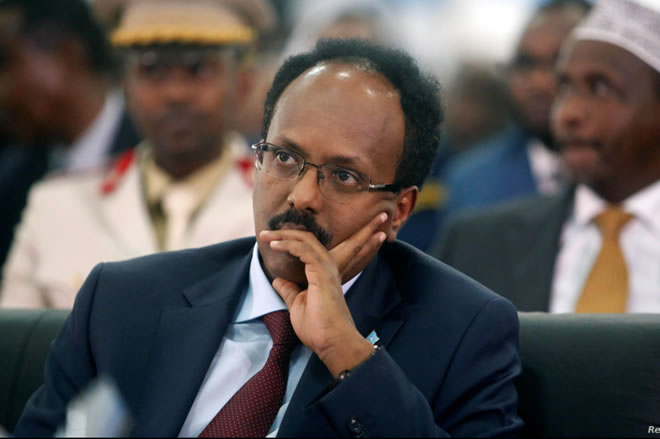
By Mohammed Yusuf
Wednesday November 11, 2020

FILE - Somalia's Presdent Mohamed Abdullahi Farmaajo
NAIROBI - The International Crisis Group says Somalia is getting behind schedule on conducting parliamentary and presidential elections. The Brussels-based research organization says the process is threatened by disagreements and the lack of a mechanism to handle disputed election results. It’s calling for term extensions to avoid political conflict.
The Somali government’s plan to hold elections by February is facing resistance from opposition groups displeased with the choices to represent their clans in the first round of voting.
Somalia holds indirect elections in which clans choose members of parliament through special elections. Then the 275 lawmakers and 59 senators elect the president.
Omar Mahmood, a Somali analyst for the International Crisis Group, says the disagreement could affect the electoral process.
“I think it will be a little difficult with the timeline in place," said Mahmood. "We’ve already seen some slippage around that the federal electoral commission, the naming of that happened a few weeks unscheduled, the state of the electoral commission are still pending and we also see some disputes over the names that been put in forth here and so the political opposition come out.”
Another problem is the composition of proposed committees to handle electoral disputes. The central government and Somalia’s federal member states agreed to appoint the committees together. But a statement issued Tuesday by 12 presidential candidates said the list was full of members from the intelligence service and some civil servants.
In a Facebook post, Somali Deputy Prime Minister Mahdi Gulaid said the statement rejecting the government appointees was surprising, and he sees the presidential candidates as lacking confidence and “hopeless.”
Abdi Ali Hassan, a member of the current Somali parliament, blames the electoral model agreed to by leaders as an obstacle to the country’s progress.
He says the indirect election is full of corruption, blame games and nepotism, and terror groups may have a say in it. He says I always supported the one-person-one-vote plan, and the reasons I was against the indirect vote I have already explained. Those who wanted the indirect vote carried the day in support of democracy. We agreed to that idea. I won't support another indirect vote.
Mahmood says if the deadline cannot be met, then Somali leaders should agree on an extension of a few months to their terms in office to allow more time to conduct a credible election.
“At the end of the day that’s an option that we throw out there, but it must be consensus based, and the only way you can get to a consensus-based decision, there is one that is very limited in terms of duration and two is very focused on some of the technical details and making sure some of that work is done," said Mahmood. "So I think there is room for the international community or others to explore the idea. Ultimately it comes down to the Somali stakeholders themselves.”
The Brussels-based group notes Somali politicians are open to a slight adjustment to the election time frame.